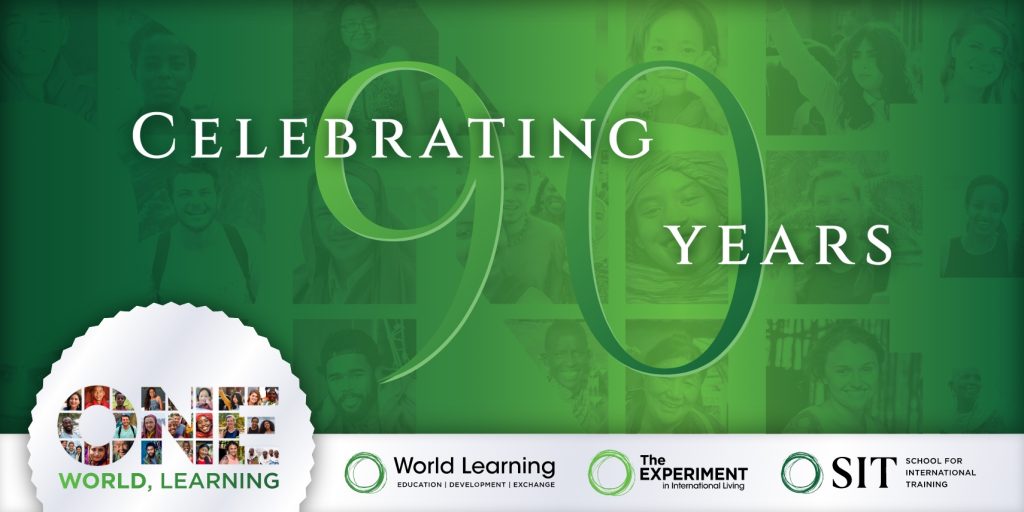-
What We Do
- WHERE WE WORK
-
About Us
 Welcome Message from Carol Jenkins
Welcome Message from Carol JenkinsFor more than 90 years, World Learning has equipped individuals and institutions to address the world’s most pressing problems. We believe that, working together with our partners, we can change this world for the better.
On my travels, I’ve had the opportunity to meet with many of those who have joined us in this mission. In Baghdad, we’ve trained more than 2,300 Iraqi youth who are already giving back at home. In London, our partners in the TAAP Initiative strongly believe that we are all responsible to practice inclusion. And in Vermont, our Experiment in International Living and School for International Training participants prove every day that they have the tools and the determination to change the world.
Please join us in our pursuit of a more peaceful and just world.
- Get Involved
Media Center > Press Room > Press Release
World Learning Builds on 90 Years of Intercultural Education and Programs
Publication Date: March 4, 2022
Publication Location: WASHINGTON
Contact: Abby Henson | [email protected]

World Learning is honoring its 90th anniversary since sociologist Donald Watt launched The Experiment in International Living in 1932. This flagship program focusing on intercultural exchange led to the establishment of both School for International Training and World Learning.
The anniversary’s theme, “One World, Learning,” highlights the interconnection between World Learning’s three branches, which all aim to create a more sustainable, peaceful, and just world through education, development, and exchange.
“As we honor our 90th year, our work has never been more relevant. With this anniversary comes an opportunity to honor our past, acknowledge the challenges of the present, and look with hope toward the future,” said World Learning CEO Carol Jenkins.
The Experiment in International Living began in 1932 with Watt’s innovative and modest vision – people should learn to live together by living together. He promoted peace through intercultural understanding by taking young Americans abroad to live with and learn from other cultures.
“Right from the first, the Watt trips were taken seriously, not as a form of ‘school,’ but as a different type of educational challenge – physically, mentally, and emotionally,” wrote Watt’s daughter, the late Phyllis Watt Ingersoll.
Ninety years later, that experiential learning approach remains the bedrock of The Experiment’s life-changing programs for high school students. It is also the foundational principle behind the organizations that grew from Watt’s original experiment: School for International Training, an accredited provider of undergraduate and graduate education on seven continents; and World Learning, a global nonprofit organization with education, development, and exchange programs spanning more than 150 countries.
The anniversary will include a series of events throughout 2022 that highlight the importance of intercultural understanding and inspire support for the work ahead.
World Learning Board Chairman Lawrence Cooley said that work is crucial.
“Around the world, our students and program participants, faculty and staff build innovation and hope from challenges – whether that’s conflict, climate change, racism, or global health. Together, we are finding ways to learn and grow in our communities and countries. We are coming together to devise solutions and expand our understanding of one another. It’s clear to us that these solutions are essential, especially in today’s world,” Cooley said.
Still headquartered on a scenic campus above Brattleboro, Vermont, World Learning today also has headquarters in Washington, D.C., and program centers across the globe.
With some 70,000 alumni, The Experiment still sends hundreds of U.S. teenagers abroad each summer for life-changing experiences. SIT Study Abroad offers more than 80 undergraduate programs, including multi-country comparative programs through the International Honors Program. SIT Graduate Institute provides internationally focused graduate-level degrees addressing the world’s most critical global issues. And World Learning oversees programs with participants worldwide, including thousands of emerging leaders who come to the United States on international professional, academic, and youth exchanges.
“In the sweep of nine decades, we have grown and evolved, changed and innovated to address the critical needs and conversations of our times. We are one world, learning,” said Jenkins. “This year, we are inviting friends around the world to join us as we build on these accomplishments.”
In-person and virtual events, receptions, and programs will be held throughout 2022 and will be posted on World Learning’s 90th Anniversary website.
Moments in World Learning history:
- Immediately following World War II, The Experiment begins sending groups to western Europe to help rebuild communities. These were some of the first-generation community service and volunteer programs to be built into intercultural education.
- Seeking to attract the most dynamic students from across the U.S., in 1940, The Experiment offers scholarships to young people from different geographic and socioeconomic backgrounds – a practice that continues today. More than 50 percent of Experimenters receive some form of financial support.
- The Experiment is a founding member of Federation EIL, Inc., an independent nonprofit organization that brings together a global network of organizations in 17 countries. Federation EIL members promote intercultural immersive experiences through homestays, study abroad programs, language training, and work exchanges.
- In 1961, President John F. Kennedy names former Experimenter Sargent Shriver as the first director of the new Peace Corps. Shriver turns to The Experiment President Gordon Boyce to help train the first Peace Corps volunteers at Experiment headquarters in southern Vermont.
- In 1964, Peace Corps training activities lead to the establishment of an academic institution, School for International Training. Later, The Experiment’s Cooperative Overseas Program, a program for university students, evolves into SIT Study Abroad, growing to enroll more than 2,000 participants annually.
- In the mid-1970s, the organization puts decades of experience into practice through a Projects and Grants unit that manages grant-funded assistance programs in developing countries. It also begins expanding its portfolio of international exchange programs. These two units eventually merge to become World Learning, the nonprofit global education, development, and exchange arm.





